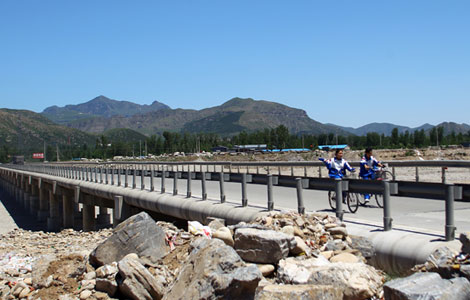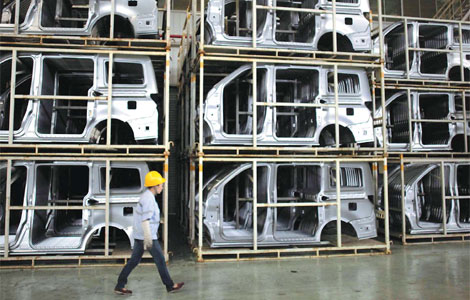Debate rages over lingua franca
Updated: 2013-06-18 21:52
By LI LIANXING IN LIBREVILLE (chinadaily.com.cn)
|
|||||||||||
The second New York Forum Africa concluded in Libreville, Gabon on Sunday. The forum saw people from around the world discuss the future of Africa but the lingua franca soon became a hot topic.
Given the increasing bond between China and Africa, a Chinese delegation was invited to discus the advantages of speaking English or French and the obstacles faced by investors in Francophone countries that do not speak French.
Some delegates complained that they couldn't even order breakfast in English in the hotel and they felt isolated on the streets without a French interpreter.
"We have already tried very hard to learn a foreign language, English, but now it seems to us it's nearly useless and I don't think I have time to learn another one," said a Chinese entrepreneur who produces sewing machine.
English has long been the mandatory course for students in China and some first and second-tier cities make it compulsory for primary school. All the major tests in China, from the College Entrance Examination to professional tests at work, require English as part of the test.
"After the opening up and reform policy, we are familiar with English and also it's more convenient to do business worldwide," said Liu Jun, vice-president of Avic International Holding Corp. "So in African Francophone countries we feel inconvenienced because everything needs to be translated."
He said apart from the language, the social, political and business culture in these countries also differs from those of Anglophone countries.
"The legal system is a challenge for us," he said, adding that turbulence in certain countries like Mali and the Central Africa Republic also shook their confidence in investing in Francophone countries.
It's difficult to find out statistics of investment preference from China to Africa, but it can be gauged by some major investors' choice.
For instance, the China-Africa Development Fund (CAD Fund) as one of the main investors and supporter of Chinese business in Africa has already established more than 30 representative offices across the continent. None are based in a Francophone country.
They have spent $2.5 billion in more than 60 projects but again, none are in any of the Francophone countries.
Even within the African nations, there is a division of investment preference, according to Katie Fettea, a senior analyst with a South African consultancy company. But there are huge opportunities waiting to be tapped, she said.
"People have to realize that there are more than 30 African countries speaking French, with a total population of more than 115 million, which means it has a huge market and business potential."
For Chinese enterprises and investors, this could be another opportunity to expand their investment, according to Wang Yong, vice-president of the CAD Fund.
"We are going to open our first offices in Francophone countries soon in Gabon or the Congo Brazzaville, and we are also discussing several projects with our partners from those countries," he added.
Today's Top News
Snowden denies being Chinese spy: media
US, Russia to sign new deal on nuke reduction
CPC's fight against bureaucracy making progress
Floods strand 6 trains in Xinjiang
China's FDI edges up 0.29% in May
Putin, Obama face off over Syria
China's home price rise continues to slow
New legal document targets polluters
Hot Topics
Lunar probe , China growth forecasts, Emission rules get tougher, China seen through 'colored lens', International board,
Editor's Picks

|

|

|

|

|

|





